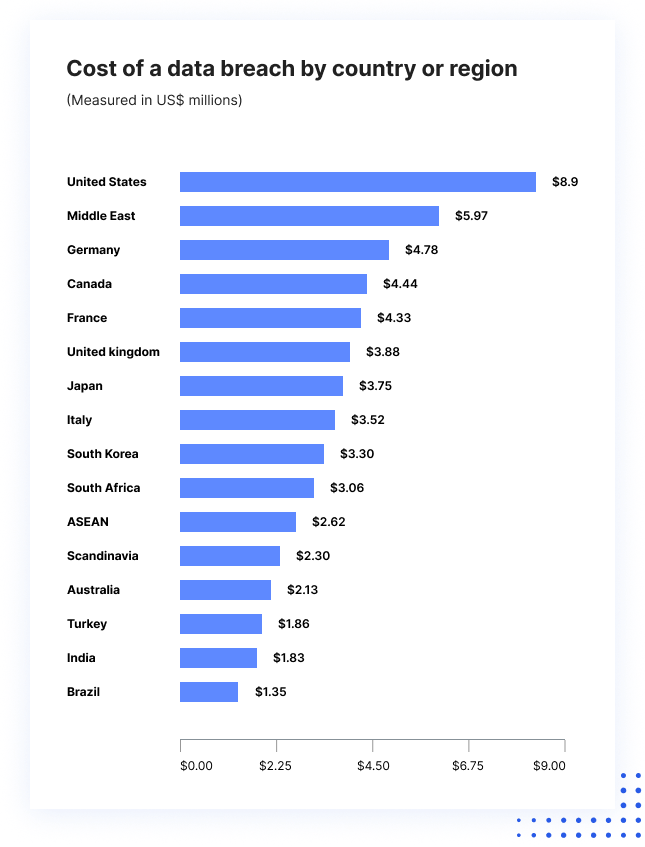Robust security measures are crucial for preventing fraud and safeguarding against data breaches. They act as the first line of defense in protecting sensitive information.
In the digital age, the importance of securing data cannot be overstated. Businesses and individuals alike face an ever-evolving threat landscape, with cybercriminals becoming more sophisticated in their methods. Implementing strong security protocols is not just about risk management; it’s a fundamental aspect of maintaining trust and ensuring the integrity of online systems.
Without such measures, the consequences can range from financial loss to severe reputational damage. As cyber threats continue to grow in complexity and scale, prioritizing security is not optional but imperative for anyone who values the confidentiality, availability, and integrity of their data.

Credit: www.simplilearn.com
The Cyber Threat Landscape
Cybersecurity is more crucial than ever. With our lives intertwined with the digital world, protecting data becomes paramount. A breach can lead to loss, from personal identity theft to massive corporate downfalls.
Rising Incidents Of Data Breaches
Data breaches are on the rise. They threaten personal and corporate security. Sensitive information falls into the wrong hands. This leads to fraud and a loss of trust.
- Financial sectors face the most attacks.
- Healthcare records are a goldmine for thieves.
- Retailers battle to secure customer data.
Evolving Techniques Of Cybercriminals
Cybercriminals are smart. They evolve their tactics rapidly. Traditional security measures often fall short against these advanced attacks.
| Old Technique | New Technique |
|---|---|
| Phishing emails | Spear phishing |
| Malware | Ransomware |
| Password attacks | Credential stuffing |
Artificial Intelligence (AI) helps criminals create more believable fake sites and emails. Internet of Things (IoT) devices offer new ways to attack.
Vulnerabilities In Data Security
Vulnerabilities in Data Security are critical weaknesses that cybercriminals exploit. Companies must understand and strengthen these areas to prevent unauthorized access to sensitive information. Let’s explore the common weak points and learn from past security failures.
Common Weak Points In Systems
Systems often have weak points that can lead to data breaches.
- Outdated software lacks current security patches.
- Weak passwords are easy to guess or crack.
- Unencrypted data is vulnerable to interception.
- Phishing attacks trick users into revealing sensitive info.
- Insufficient network security allows intruders in.
Organizations must regularly update, educate employees, and employ strong encryption to safeguard data.
Case Studies Of Security Failures
Studying past failures helps us improve security.
| Company | Year | Breach Impact |
|---|---|---|
| Equifax | 2017 | 145 million individuals affected |
| Yahoo | 2013-2014 | 3 billion accounts compromised |
| Target | 2013 | 41 million customer payment card accounts stolen |
These cases show the need for robust security measures. They teach that even large companies are not immune to attacks. By understanding these incidents, businesses can better prepare and protect against similar threats.
Consequences Of Inadequate Security
The consequences of inadequate security in today’s digital landscape can be catastrophic for businesses. A weak security posture not only invites cybercriminals but also triggers a chain of negative outcomes.
Financial Repercussions For Businesses
A breach can lead to direct financial loss. This includes costs for:
- Investigations to uncover the extent of the damage
- Legal fees from ensuing lawsuits
- Regulatory fines for non-compliance with data protection laws
- Remediation efforts to secure systems post-breach
Indirect costs also add up, like:
- Increased insurance premiums
- Loss of intellectual property
- Downtime affecting productivity
These expenses can cripple a company’s finances. Small businesses, often less protected, are at higher risk.
Impact On Customer Trust And Loyalty
Trust is the foundation of customer relationships. A breach can shatter this trust overnight. Customers may:
- Leave for competitors that seem more secure
- Avoid online transactions, fearing data misuse
- Share negative experiences, harming the brand’s reputation
Loyal customers are hard to win back once trust is lost. It takes time and effort to rebuild a damaged reputation.

Credit: www.leewayhertz.com
Core Principles Of Robust Security
In a world where data breaches and fraud are on the rise, robust security is a must. A strong security strategy defends against threats before they strike. It keeps sensitive information safe. Let’s explore the core principles that form an unbreakable shield around your data.
Layered Defense Mechanisms
A layered approach is key to robust security. It’s like an onion. More layers mean more protection. Here are the elements:
- Firewalls act as the first line of defense.
- Antivirus software scans for known threats.
- Encryption locks data away from prying eyes.
- Access controls ensure only the right people get in.
- Monitoring tools keep an eye on system activity.
Proactive Threat Detection
Waiting for a breach to happen is risky. Proactive detection is smarter. It finds threats before they cause harm. Here’s how it works:
- Analyze patterns to spot unusual behavior.
- Use AI to predict and identify emerging threats.
- Regularly update systems to close security gaps.
- Train staff to recognize and report risks.
These principles form the foundation of a security system that’s tough to crack. They protect data and keep fraudsters out.
Technological Innovations In Security
In the digital age, security breaches and fraud pose significant risks to individuals and businesses alike. Embracing cutting-edge technology is essential for robust security measures. Let’s explore how technological advancements fortify our defenses against these threats.
The Role Of Ai And Machine Learning
Artificial Intelligence (AI) and Machine Learning (ML) stand at the forefront of security innovation. These technologies adapt and respond to threats in real-time. AI and ML analyze patterns and detect anomalies that could signal fraudulent activities. With each interaction, they grow smarter, offering unparalleled protection.
- Real-time monitoring: AI systems watch over transactions 24/7.
- Pattern recognition: ML algorithms learn from data to identify potential fraud.
- Automated alerts: Suspicious activities trigger instant notifications.
Blockchain For Data Integrity
Blockchain technology is transforming how we protect data. Its decentralized nature ensures transparency and traceability. Every transaction gets recorded in multiple locations, making unauthorized changes nearly impossible. Blockchain’s cryptographic security fosters trust in digital interactions.
| Feature | Benefit |
|---|---|
| Decentralization | Eliminates single points of failure. |
| Immutability | Secures records from tampering. |
| Encryption | Protects sensitive information. |

Credit: www.imperva.com
Best Practices For Data Protection
Best Practices for Data Protection are crucial for any business today. Protecting data against unauthorized access is a must. It safeguards your company’s reputation and customer trust. Follow these best practices to keep your data secure.
Regular Security Audits
Regular security audits identify vulnerabilities. They ensure all systems are up-to-date. Audits test for weak spots that hackers could exploit.
- Check software for the latest security patches.
- Review access controls to sensitive information.
- Assess physical security measures.
Employee Training And Awareness
Employees are the first line of defense in data protection. Training helps them spot and report fraud.
| Training Topic | Benefits |
|---|---|
| Phishing Scams | Reduces risk of email-based attacks. |
| Password Management | Encourages strong, unique passwords. |
| Data Handling Procedures | Ensures safe data management practices. |
Regulatory Compliance And Standards
In today’s digital world, robust security measures are not just a choice but a necessity. Companies face threats like fraud and data breaches daily. It is critical to understand the role of regulatory compliance and standards in safeguarding data.
Understanding Gdpr And Other Regulations
The General Data Protection Regulation (GDPR) sets the standard for data protection across the European Union (EU). It impacts any business handling EU citizens’ data, regardless of location. Other regulations like the California Consumer Privacy Act (CCPA) also play a key role in protecting personal information.
- GDPR: Protects personal data and privacy in the EU and EEA.
- CCPA: Gives California residents more control over their personal information.
- HIPAA: Keeps health information safe in the United States.
- PCI DSS: Secures cardholder data across the globe.
Benefits Of Adhering To Security Standards
Meeting security standards is crucial for businesses. It builds trust and keeps data safe. Here are the key benefits:
- Gain Customer Trust: Show customers their data is in safe hands.
- Avoid Legal Penalties: Stay clear of fines and legal issues.
- Enhance Brand Reputation: Become known for security and reliability.
- Improve Data Management: Keep data organized and protected.
Adhering to these standards is not just about compliance. It’s about commitment to data integrity and customer relationships.
The Future Of Cybersecurity
As we venture into the future, cybersecurity stands as a critical shield. It protects our data from crafty cybercriminals. Businesses and individuals alike must stay informed. The digital landscape evolves rapidly. Staying ahead is not just smart; it’s necessary.
Predictions For Security Trends
The world of cybersecurity is dynamic, with new threats emerging regularly. Experts predict several key trends.
- Artificial Intelligence (AI) will play a bigger role. It will detect and respond to threats faster than humans.
- Quantum computing could break current encryption methods. Companies must develop quantum-resistant encryption.
- Remote work brings new challenges. Organizations will need stronger security for remote access.
Preparing For The Unknown In Cyber Threats
Unknown threats can strike at any time. Being prepared is the best defense. Here’s how:
- Conduct regular security audits. Find and fix vulnerabilities before attackers do.
- Invest in employee training. Teach staff about common cyber threats.
- Stay updated with security software. Always use the latest tools to protect data.
By embracing these strategies, we can strive to outpace cyber threats. The future of cybersecurity relies on our readiness to adapt and react.
Frequently Asked Questions
Why Is It Important To Prevent Data Breaches?
Preventing data breaches is crucial to protect sensitive information, maintain customer trust, and avoid financial losses and legal penalties. It safeguards a company’s reputation and ensures compliance with data protection regulations.
What Are Robust Security Measures?
Robust security measures are strong, multi-layered protections implemented to safeguard systems and data from cyber threats. These include firewalls, encryption, two-factor authentication, regular updates, and strict access controls.
What Is The Importance Of Cybersecurity And Data Protection?
Cybersecurity and data protection safeguard sensitive information from unauthorized access, ensuring privacy, and preventing data breaches that could lead to financial loss and reputational damage. They are crucial for maintaining trust in digital interactions.
Why Is It Important To Be Sure Data Is Protected And Secure?
Securing data protects against breaches, maintaining privacy and trust. It also ensures compliance with regulations, preventing costly legal issues.
Conclusion
Safeguarding digital assets is non-negotiable. Implementing strong security protocols is the key to thwarting fraud and preventing data breaches. Businesses and individuals alike must prioritize these measures. Staying vigilant and proactive is the best defense in our interconnected digital landscape.
Let’s commit to robust security and protect our data integrity.